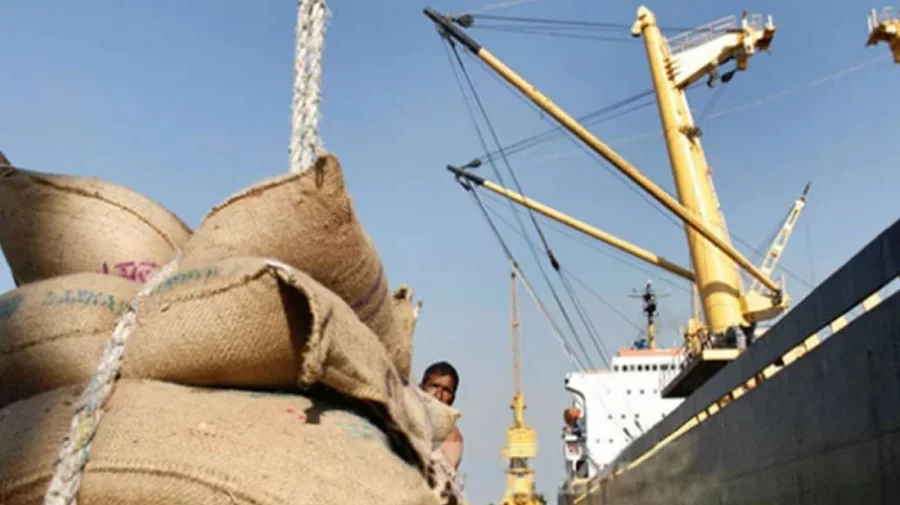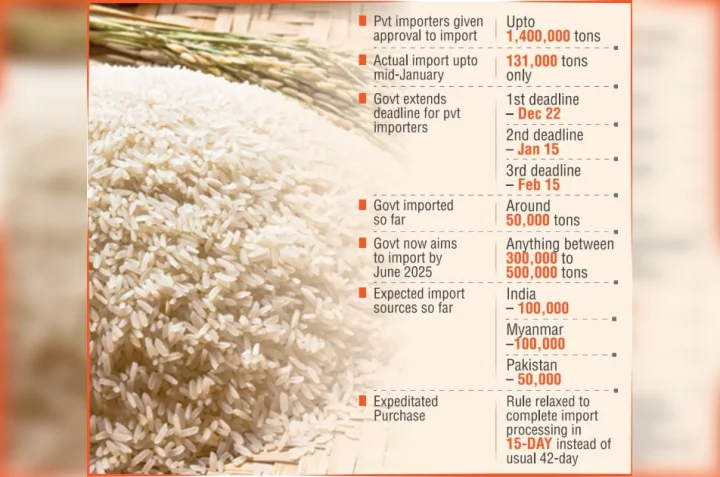Tags
Govt bends import rule to tame rice market.
Bet on private importers proven costly; govt goes for fast-tracking rice import under G2G arrangement and through int’l open tender.

Reaz Ahmad
The government rightly anticipated a flood-induced crop loss during the last Aman season.
To stabilize a volatile rice market, the food ministry, however, largely relied on private imports of rice instead of expediting its own drive to import rice on time to replenish the rapidly dwindling rice stock in public granaries.
Between November 6 and 17 last year, the Directorate General of Food (DG Food) approved the import of over 1.4 million tons of rice by 277 private importers, setting a December 22 deadline for them to complete bringing in the consignments. DG Food later extended the deadline until January 15 this year, hoping that a sufficient volume of rice would be imported by private importers, thereby aiding the government in its desperate efforts to lower the high rice prices in the market.
However, the plan did not work as expected.
By mid-January, private importers had managed to bring in only 1.3 lakh tons of rice, while the government itself had imported around 50,000 tons from India. This volume, so far, has proven insufficient to offset the high rice prices, which increased by Tk4 per kilogram earlier this month.
Finally, at a meeting of the advisory council’s economic affairs committee on January 16, the government amended the Public Procurement Rules, allowing the food ministry to adopt an “expressway route” for completing international rice import bidding in just 15 days instead of the usual 42 days. The government also approved importing rice under G2G (government-to-government) arrangements with Pakistan, an uncommon source for non-aromatic rice imports for Bangladesh.
In a separate meeting of the advisory council’s public purchase committee on January 16, the government allowed the food ministry to procure 50,000 tons of rice from Pakistan’s state-run trading corporation and another 50,000 tons from an Indian private exporter.
Officials told Dhaka Tribune on Friday that renewed initiatives are underway to import more rice through G2G arrangements with India, Vietnam, and Myanmar. Bangladesh’s previously signed memorandums of understanding for rice imports from Vietnam and Myanmar remain valid until 2027.
Additionally, the government has approved DG Food to import at least 300,000 tons of rice through international open tender under the now-relaxed Public Procurement Rules.
Pakistan is expected to have a good exportable surplus of rice this year, with its domestic rice output projected to reach an all-time high of 10 million tons. Since wheat is the mainstay of the Pakistani diet, the country requires only 40 percent of its rice output to meet domestic demand, leaving the remaining 60 percent available for export.

Rice price hike’s implications
Due to flood-induced crop losses during the Aman season, there is an estimated production shortfall of 6 lakh tons of rice, and the government’s rice stock has also fallen below the minimum food safety reserve level of one million tons.
Meanwhile, the government recently stopped operating truck-mounted sales of key commodities at subsidized prices for the poor, who are already struggling with double-digit food inflation.
Adding to the crisis, the state-run Trading Corporation of Bangladesh (TCB) has canceled the cards of over 40 percent of the 10 million poor beneficiaries who previously received monthly rice allotments at rates much lower than market prices. The government suspected irregularities in the card distribution process under the previous administration, stating that beneficiary selections were inappropriate in many cases.
In response to high domestic rice prices, the depletion of public granary stocks, and the potential losses of Aman rice due to flooding, the government reduced the rice import tariff from 62.5 percent to 2 percent on October 31 last year.
The following week, the government invited applications from the private sector for rice import permits. However, a December 20 update by the United States Department of Agriculture (USDA) reported that importers have made few purchases despite lower international prices, as the cost of importing and associated expenses still exceed domestic rice prices. In November 2024, imports amounted to only 32,580 tons.
As of late last month, four international tenders had been issued for importing rice through the government procurement system, each for 50,000 tons. The USDA report suggests that the government may issue additional tenders if necessary.
https://www.dhakatribune.com/bangladesh/371114/govt-bends-import-rule-to-tame-rice-marketPublished Date: January 18, 2025






